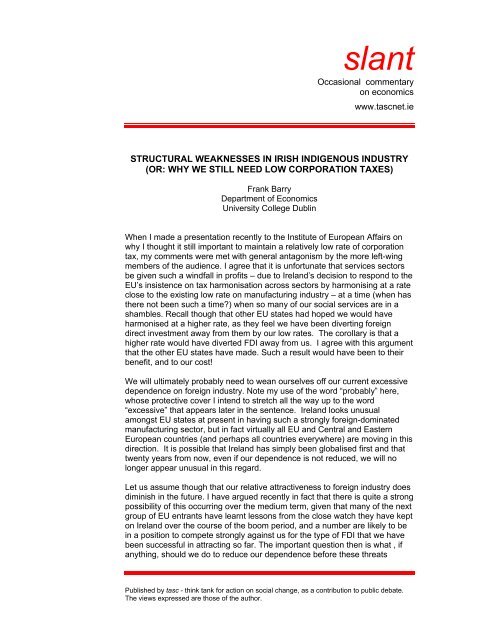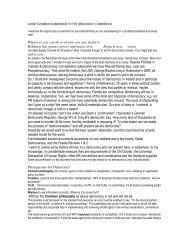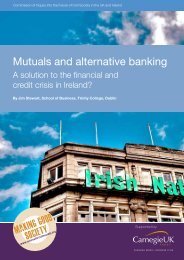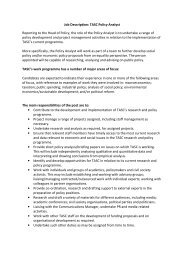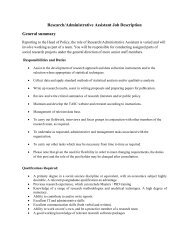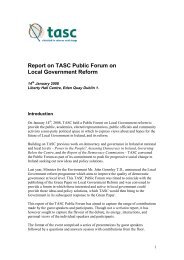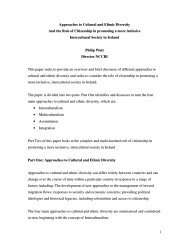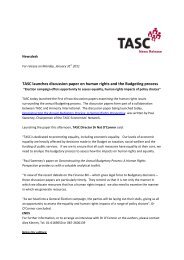download pdf... - Tasc
download pdf... - Tasc
download pdf... - Tasc
You also want an ePaper? Increase the reach of your titles
YUMPU automatically turns print PDFs into web optimized ePapers that Google loves.
slant<br />
Occasional commentary<br />
on economics<br />
www.tascnet.ie<br />
STRUCTURAL WEAKNESSES IN IRISH INDIGENOUS INDUSTRY<br />
(OR: WHY WE STILL NEED LOW CORPORATION TAXES)<br />
Frank Barry<br />
Department of Economics<br />
University College Dublin<br />
When I made a presentation recently to the Institute of European Affairs on<br />
why I thought it still important to maintain a relatively low rate of corporation<br />
tax, my comments were met with general antagonism by the more left-wing<br />
members of the audience. I agree that it is unfortunate that services sectors<br />
be given such a windfall in profits – due to Ireland’s decision to respond to the<br />
EU’s insistence on tax harmonisation across sectors by harmonising at a rate<br />
close to the existing low rate on manufacturing industry – at a time (when has<br />
there not been such a time?) when so many of our social services are in a<br />
shambles. Recall though that other EU states had hoped we would have<br />
harmonised at a higher rate, as they feel we have been diverting foreign<br />
direct investment away from them by our low rates. The corollary is that a<br />
higher rate would have diverted FDI away from us. I agree with this argument<br />
that the other EU states have made. Such a result would have been to their<br />
benefit, and to our cost!<br />
We will ultimately probably need to wean ourselves off our current excessive<br />
dependence on foreign industry. Note my use of the word “probably” here,<br />
whose protective cover I intend to stretch all the way up to the word<br />
“excessive” that appears later in the sentence. Ireland looks unusual<br />
amongst EU states at present in having such a strongly foreign-dominated<br />
manufacturing sector, but in fact virtually all EU and Central and Eastern<br />
European countries (and perhaps all countries everywhere) are moving in this<br />
direction. It is possible that Ireland has simply been globalised first and that<br />
twenty years from now, even if our dependence is not reduced, we will no<br />
longer appear unusual in this regard.<br />
Let us assume though that our relative attractiveness to foreign industry does<br />
diminish in the future. I have argued recently in fact that there is quite a strong<br />
possibility of this occurring over the medium term, given that many of the next<br />
group of EU entrants have learnt lessons from the close watch they have kept<br />
on Ireland over the course of the boom period, and a number are likely to be<br />
in a position to compete strongly against us for the type of FDI that we have<br />
been successful in attracting so far. The important question then is what , if<br />
anything, should we do to reduce our dependence before these threats<br />
Published by tasc - think tank for action on social change, as a contribution to public debate.<br />
The views expressed are those of the author.
ecome too virulent? Consider one of the more extreme actions we could<br />
take – agreeing to corporation tax harmonisation at the EU level for example.<br />
This would presumably give rise to substantial foreign direct divestment. This<br />
would certainly wean us off FDI, but at what cost?<br />
Many might assume that indigenous industry in this event, being thrown back<br />
onto its own resources, would have no option but to adjust. This perspective<br />
though is coloured by the notion that a country will always find a range of<br />
goods in which it has a comparative advantage. This notion has been<br />
restated recently as saying “countries do not go out of business”. This<br />
perspective, however, I critiqued in my 2002 paper in the ESRI’s Quarterly<br />
Economic Commentary.<br />
It assumes that such an adverse shock will reduce wages or otherwise induce<br />
sufficient efficiency-enhancing changes that new firms and new industries will<br />
eventually emerge in Ireland. In the “regional economy” perspective against<br />
which I contrasted this view however, wages, entrepreneurship,<br />
management- and work practices etc. need not be much affected by such a<br />
shock. Labour may instead flow out of the economy, rather than new<br />
industries and new firms emerging. In a nutshell, “while countries can’t go out<br />
of business, regions can and do!” Who amongst us old enough to remember<br />
the 1980s, never mind the 1950s, can deny this as a possibility?<br />
Such a catastrophe might not occur, even if foreign industry were to leave<br />
precipitously, if we already had a strong dynamic indigenous sector in place<br />
that could take up the slack. We do not at present however, as I will show in a<br />
moment.<br />
What we need to do, if we fear divestment, is to build a stronger indigenous<br />
sector before this occurs. How to do this is one of the deepest, hardest and<br />
most important questions in Irish economic development, and one on which,<br />
to my own great disappointment, I do not have much wisdom to impart at<br />
present. But it seems to me crucial that some such framework be put in place<br />
and be seen to be working before we begin to think of raising corporation tax<br />
substantially. Otherwise, that colourful phrase about cutting off one’s nose to<br />
spite one’s face would appear apt!<br />
So, where do these structural weaknesses manifest themselves? Across<br />
virtually all dimensions, I would argue. We think of Ireland as a highly exportoriented<br />
economy, yet indigenous manufacturing firms export less than onethird<br />
of their output (compared to a figure of over 90 percent for foreignowned<br />
firms). This is less than the export-output ratios for the manufacturing<br />
sectors of 7 of the 8 EU countries for which OECD (2001; table C 2.2.1)<br />
presents data.<br />
We feel proud of the fact that we have diversified our exports strongly away<br />
from the UK market, yet the UK still takes 40 percent of indigenous<br />
manufacturing exports. Admittedly this figure has fallen by around 1<br />
percentage point a year over the previous 15 year period, but the UK market<br />
is now a much more volatile one to be in given that we can do little to protect<br />
ourselves against sterling fluctuations.<br />
We think of Ireland now as a high-tech economy, yet only 26 percent of<br />
indigenous employment is in medium- or high-tech sectors (16 percent and<br />
Published by tasc - think tank for action on social change, as a contribution to public debate.<br />
The views expressed are those of the author.
10 percent respectively), compared to 76 percent of foreign-sector<br />
employment (with 20 percent in medium-tech and 56 percent in high-tech<br />
sectors).<br />
We laud the fact that R&D expenditures relative to GDP are now at the levels<br />
attained in other small European economies. Yet, when account is taken of<br />
the high-tech sectoral location of our foreign industry, we find that on a sectorby-sector<br />
basis Ireland emerges poorly by EU standards. Very little of this<br />
R&D, furthermore, is done by indigenous firms – whose spend per job is even<br />
lower than for foreign firms in most sectors – and the indigenous sector has a<br />
very poor record in developing patentable processes or inventions.<br />
The tendency for multinationals to concentrate R&D expenditures at their<br />
home locations might be taken to indicate that the Irish situation may be set<br />
to change, given the strong growth in outward FDI from Ireland over the<br />
course of the 1990s. These Irish-owned multinationals however are<br />
disproportionately located in non-traded sectors such as Construction and<br />
Paper and Packaging and do not exhibit the type of “created asset” intensity<br />
(derived from R&D and strong product differentiation) that has been found for<br />
Korean or Taiwanese multinationals, for example, by Dunning et al. (2001).<br />
Irish indigenous overseas mergers and acquisitions activities in the high-tech<br />
area, furthermore, are concentrated on the US and tend to be directed toward<br />
“technology sourcing”, which can in fact lead to a downsizing of domestic<br />
R&D facilities and a reduction in high-skill employment at home.<br />
In none of these areas then does indigenous industry at present appear<br />
capable of sustaining the economy on a strong upward trajectory. If Ireland’s<br />
foreign sector were to be decimated by a sharp increase in our corporation<br />
tax rate much of the economic progress made over the boom period would<br />
likely disappear along with it. These are areas of policy concern that<br />
advocates of high corporation tax rates ignore at very great peril!<br />
● ● ● ● ● ● ● ● ● ● ● ● ● ● ● ● ● ● ● ● ● ● ● ● ● ● ● ● ● ● ● ● ● ● ● ● ●<br />
For further information, contact Frank at frank.barry@ucd.ie<br />
References<br />
Barry, F. (2002) "The Celtic Tiger Era: Delayed Convergence or Regional<br />
Boom", ESRI Quarterly Economic Commentary, Summer 2002; available at:<br />
http://www.ucd.ie/~economic/staff/barry/research.html<br />
Barry, F. (2002) "A Note on Transfer Pricing and the R&D Intensity of Irish<br />
Manufacturing", UCD Working Paper 02/30, available at:<br />
http://www.ucd.ie/~economic/workingpapers/2002.htm<br />
Barry, F., H. Görg and A. McDowell (2003) “Outward FDI and the Investment<br />
Development Path of a Late-Industrialising Economy: Evidence from Ireland”,<br />
Regional Studies, (forthcoming); available at:<br />
http://www.ucd.ie/~economic/staff/barry/fdi.html<br />
Published by tasc - think tank for action on social change, as a contribution to public debate.<br />
The views expressed are those of the author.
Dunning, J.H., C.S. Kim and J.D. Lin (2001) “Incorporating Trade into the<br />
Industrial Development Path”, Oxford Development Studies, 29, pp. 145-154.<br />
OECD (2001) Science, Technology and Industry Scoreboard: Towards a<br />
Knowledge-Based Economy, Paris: OECD.<br />
O’Sullivan, M. (2000) “The Sustainability of Industrial Development in Ireland”,<br />
Regional Studies, 34, 3, 277-290.<br />
Published by tasc - think tank for action on social change, as a contribution to public debate.<br />
The views expressed are those of the author.


